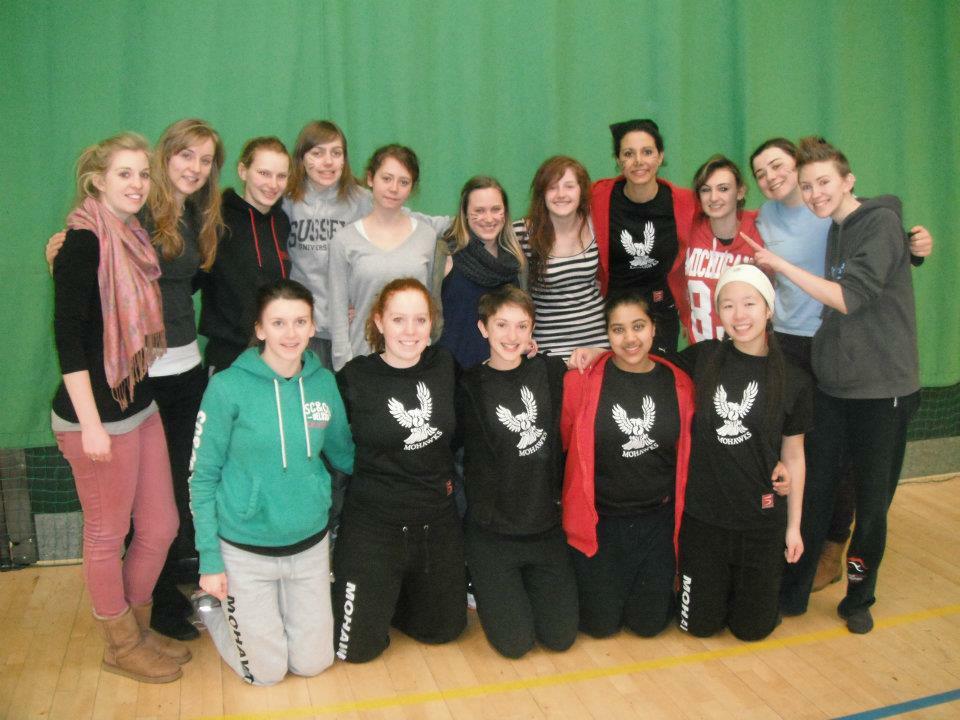- 6th February 20129th March 2022
- by megan
This weekend, we took two women’s teams to indoor regionals. It was quite possibly the best weekend of my ultimate playing career. I had more fun than I realised you could have at a competitive tournament, and not to be all ‘Andrew Fleming Disc 5’ but I LOVE THIS TEAM. And for me, our spirited play as a team and as a club is a huge part of what makes playing with this group of women so amazing. Our first team won spirit, and I won an individual spirit award, which actually almost made me cry because (as most people who know me know) I’m pretty keen on spirit, and it’s something I think is hugely important in the game. But way more importantly, of the 10 or 11 nominations for that award, three of my teammates also got nominated, and one of our second team players as well (yes, yes, before you ask, I got emotional again when someone told me that). I’ve been trying to think about what we did as a club, a team and as individuals that other teams recognised this weekend, and I’ve come up with quite a few points so this will be a three-parter post (I think). One thing which links all of these points is that they are less about ‘what is spirited behaviour’, and more about spirited thinking, which I hope I’m going to make a pretty strong case for over the next few posts. So here it is:
Spirited Thoughts: Part 1
I watched a TED talk recently which changed how I approach a whole ton of things in life. TED talks are basically short talks (10 mins ish) by people who are really passionate, and really good at talking, about something. This one was by a video blogger called Jay Smooth, and it’s about how to deal with being called racist (see it here).
Errr, so how the heck does that relate to spirit?
In this clip (you should watch it, because he’s far cooler than me), he’s talking about the fact that we take being told we have just done, or said, something racist as being told that we are racist, and therefore by extension that we are bad and terrible people. But, he argues, only in the case of racism would we do this. If someone told you that you had something in your teeth, you wouldn’t respond with ‘Nope, you’re wrong, I’m a clean person’ – you’d thank them and pick that piece of spinach out of your teeth (because it’s always spinach). And if we could react to being informed we had said or done something racist in a similar way, Jay argues that we’d be a lot better at discussing race. He talks about this as ‘a dental hygiene model’ for talking about race.
I think it’s a genius way of conceptualising the issue, but I also think it’s a more valuable distinction than just for talking about racism. I would argue that this ‘what you did’ vs ‘what you are’ dichotomy is applicable to almost every moral issue. There’s a lot of psychological research which suggests that one of the most important ways we evaluate ourselves, as individuals and as groups (like, say, a sports team) is in moral terms. We are very invested in wanting to feel like moral people, so we are very defensive about being told that we are not moral people.
In our sport, to be spirited is to be moral. And we very much want to be moral.
Jay Smooth’s ‘dental hygeine model’ of moral judgement has two implications for being a spirited player and how we talk about spirit, in my opinion. Firstly, approaching spirit as a behaviour, rather than a personality trait, means we can recognise that it is something we must continuously do and put effort into. Just because I won a spirit award this weekend, that does not mean that I will be spirited next weekend. The fact that I will consciously monitor and regulate my behaviour on and off pitch next weekend is what will help me be a spirited player next weekend. I’m not saying that takes no effort – I’m saying that we need to remember to put that effort in every game, and not take for granted our ‘spirited nature’. This weekend, I saw Beth, probably our feistiest player, regulate her reflexive response to an aggressively called ‘foul’, and instead of snapping back with ‘contested’, give her mark the disc back and calmly say ‘yup’ – I definitely don’t find that situation easy, and that’s why I am so proud of how she responded to that call made in the heat of the moment (hey, Beth, how’s it going). Beth put the effort in and behaved in a spirited manner, and I feel that this behaviour was repeated across the tournament this weekend by our entire club.
The second implication is that it means we can have a new, less emotionally charged way of discussing spirit, by moving our conceptualisation of it away from essentialism. When we critique another team, we can tell them that their behaviour was unspirited in a game – and accept that there may be situational factors influencing it – without calling them terrible people. As a general culture, the West absolutely loves essentialism – the idea that you behave the way you do because of who you are – but personally (and scientifically, as there’s plenty of evidence to back me up) I don’t buy it. Good people do bad things, often accidentally, and if we can’t explain to those good people that they’ve done a bad thing without calling them terrible people, how are they going to learn and not do that bad thing again? The reason we’re so defensive about being called badly spirited is because we want so badly to be spirited. Being told we’ve behaved badly in the current essentialist conception means not that we messed up one time, but that we are horrible people who will always mess up. And then we tell the people who give us this very hurtful, personal criticism to… go somewhere else, shall we say… and ignore their feedback. This means we’re less likely to learn how to behave more spiritedly in future.
In contrast, if we talk about spirit as a behaviour, which we can and will sometimes get wrong, we can improve our spirit (by improving our behaviour) when others let us know that we’ve behaved badly (but aren’t bad people). Feedback about spirit becomes meaningful and useful, and helps us to regulate and monitor our behaviour – that thing that we need to do to behave spiritedly.
For Squaws, ‘spirited’ is not something that we are. It is a perpetual goal, which we must constantly strive for. This weekend, I think we worked really hard, and we got it right. Great work, team – I am so proud of all of you.
 Blog Posts
Blog Posts


